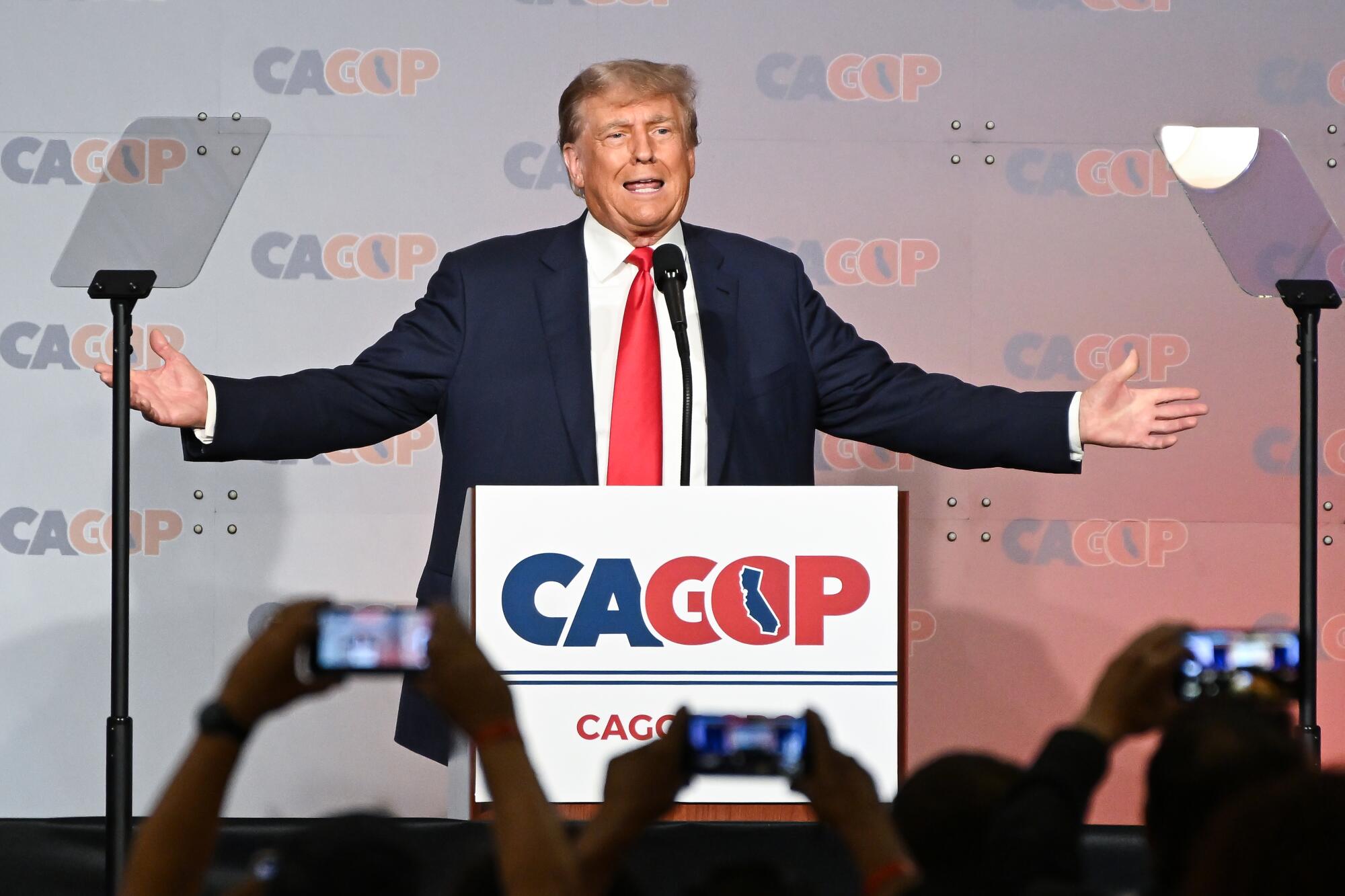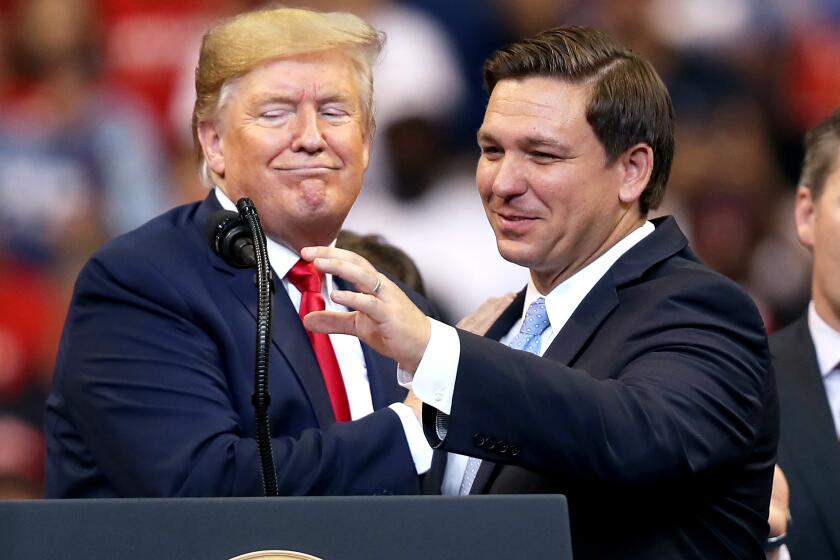
- Share via
It’s often said that Donald Trump has a cultlike following. But that’s far too benign.
“Star Wars” has a cultlike following. Taylor Swift has her cult of “Swifties.” A political organization that has no platform other than loyalty to the leader is not a cult, it’s an autocratic movement.
The tragicomic chaos in the House in the last week is the natural result of a political party that has lived under Trump’s thumb. It should end any pretense that the current Republican Party is a serious governing party.
As Hannah Arendt wrote in “The Origins of Totalitarianism”: “Total loyalty is possible only when fidelity is emptied of all concrete content, from which changes of mind might naturally arise. The totalitarian movements, each in its own way, have done their utmost to get rid of the party programs which specified concrete content and which they inherited from earlier, non‑totalitarian stages of development.”
The amendment’s Section 3 bars officials who betray the government from holding office again. Trying to keep the elected president out of office by force counts by any standard.
It seems like another time in another galaxy, but not that long ago there actually was some ideological diversity within the Republican Party.
In 1966, Time ran a cover story highlighting the winners of the 1966 midterm elections as a “Republican Resurgence,” after the Goldwater defeat of 1964. Time’s editors selected six Republicans as being emblematic of this rebirth: California Gov. Ronald Reagan, Michigan Gov. George Romney, Illinois Sen. Charles Percy, Oregon Sen. Mark Hatfield, Massachusetts Sen. Edward Brooke and New York Gov. Nelson Rockefeller.
The six governors and senators had differences of opinion on almost all major issues. Hatfield, deeply influenced by his service in World War II, never voted for a bill to authorize U.S. military engagement. He was one of only two Republican senators who voted against the 1991 Gulf War.
The only plausible mechanism to prevent Trump from winning the GOP nomination is the criminal justice system, which other candidates have attacked and delegitimized.
With Sen. George McGovern, Hatfield co-sponsored 1971 legislation calling for a complete withdrawal from Vietnam. Reagan, on the other hand, was consistently supportive of the Vietnam War and campaigned against the creation of Medicaid.
In the 1990s and early 2000s, the Republican governors who were pro-choice governed states with a larger collective population than the Republican antiabortion governors. Bill Weld of Massachusetts, Pennsylvania’s Tom Ridge, Arnold Schwarzenegger in California and New York’s George Pataki all were proudly pro-choice.
Today, there are no Republican governors who support abortion rights, and many are actively working to criminalize abortions in their states. The Republican Party three decades ago was overwhelmingly a white-dominated party, but it allowed for at least some dissent and disagreement.
While it is difficult to attribute any deliberate or methodical plan to Donald Trump, whose mind operates like an old-fashioned pinball machine on tilt, his basic antidemocratic, strongman instincts have crushed dissent in the Republican Party, empowering the underlying authoritarian impulses within the party. A once-center-right political party with core ideological principles is now marching toward the formation of an autocratic state.
That democracy can degenerate into tyranny through freely elected demagogues is an abiding paradox.
It’s possible that Trump will not be the Republican nominee in 2024, but his success in molding the party to his image ensures that anyone who wins will continue down an authoritarian path.
When Ron DeSantis ran for governor of Florida in 2018, he aired a commercial showing his toddler daughter building a border wall with toy blocks, followed by a shot of him holding his infant son and reading from a book, “Then Mr. Trump said, ‘You’re fired.’” His wife also appeared in the ad, saying, “People say Ron is all Trump, but he is so much more.”
What’s unfolding in the Republican Party is an inevitable step in the cycle of authoritarian movements. What once was deemed sufficiently pure is judged to be inadequate and in need of purging.
The Night of the Long Knives, the murder of Leon Trotsky, the Red Guards, the Khmer Rouge — each was the result of a radical movement further purifying its core membership and ideology, and something very similar is taking place among today’s Republicans.
Column: Is there any way to shift the bizarre Republican conviction that only Trump will save them?
No primary candidate with Trump’s lead in the polls at this stage of the race has ever failed to get their party’s nomination. But Trump is an unprecedented candidate.
When Trump emerged in 2015, he was initially rejected by Republican voters. In May 2015, Donald Trump polled at 3% among Republicans and Republican-leaning independent voters. While it’s not unusual for a new and still-unknown candidate to start with a low number, Trump had almost a 100% name recognition among potential voters.
Republicans knew who he was; they just didn’t like him. A May 2015 Washington Post–ABC News poll found that just over 20% of Republicans viewed Trump favorably. By early December 2015 — and after his attack on John McCain’s war record, his mocking of a disabled reporter and his calling for a Muslim ban — Trump had surged to his largest lead during the Republican primary, opening up a 35%-to-16% margin over Ted Cruz.
Jeb Bush, who led the field in early polling, was by then at the same 3% level of support that Trump had in May. The media coverage of Trump’s rise evidenced an unwillingness to grasp Trump’s appeal. “Donald Trump Leads Florida Polls, Despite Call for Muslim Travel Ban” was the headline in the New Times Broward–Palm Beach. “Trump Poll Surge Continues Despite Backlash Over Muslim Ban,” trumpeted the Dec. 10, 2015, broadcast of Voice of America News.
This was like reporting that Jim Beam sold a lot of bourbon even though it contained alcohol. Trump was rising with Republican voters because of his racism and religious bigotry.
There was no backlash with the majority of Republican primary voters. The exact opposite was occurring. Trump’s hate was creating a surge of appeal.
Donald Trump understood the true nature of the Republican Party better than the party’s leaders. “This suggestion is completely and totally inconsistent with American values,” then-Senate Majority Leader Mitch McConnell said as he denounced Trump’s proposed Muslim ban. “I do not think it is reflective of our principles, not just as a party but as a country,” then-House Speaker Paul Ryan said of the ban.
But it was his call for a Muslim ban that helped Trump clinch the 2016 nomination. McConnell and Ryan and the establishment donor class of the Republican Party would never admit publicly that the xenophobia and racism that appealed to Trump voters were far more motivating to Republican voters than the small-government, low-taxes, constitutionally conservative so‑called “values” they insisted were the true core of the party.
But their commitment to their deeply held beliefs was so weak that they now supported a man who bragged he was “the king of debt,” refused to release his tax returns to show he even paid taxes and whose Muslim ban was a religious test that was anathema to constitutional principles.
They didn’t care about anything but remaining in power, and they thought they could use Trump while controlling him.
There is a childlike need for many Republicans in what was once “the establishment” to believe that the Trump years were some aberration, that the party was “hijacked” by Donald Trump. The problem with this is that the passengers on the hijacked plane do not cheer for the terrorist. But in the Republican Party, the hijacker is the most popular person on the plane.
Trump and Trumpism dominate the Republican Party because he represents what the Republican Party wants to be. There is no “normal” for the party to return to. It is an autocratic movement, not a traditional American political party. To believe this movement cannot win and end democracy as we know it would be as dangerously naive as thinking that the Donald Trump who announced his candidacy in 2015 with 3% of support within the party could never be elected president.
None of us can choose history, but history can choose us. The fate of the American experiment is in our hands. America or Trump? The next 13 months will decide our future.
Stuart Stevens is an advisor to the Lincoln Project, a political consultant and the author of several books. This article is an adapted excerpt from his latest book, “The Conspiracy to End America: Five Ways My Old Party Is Driving Our Democracy to Autocracy,” which will be published Oct. 10.
More to Read
A cure for the common opinion
Get thought-provoking perspectives with our weekly newsletter.
You may occasionally receive promotional content from the Los Angeles Times.













